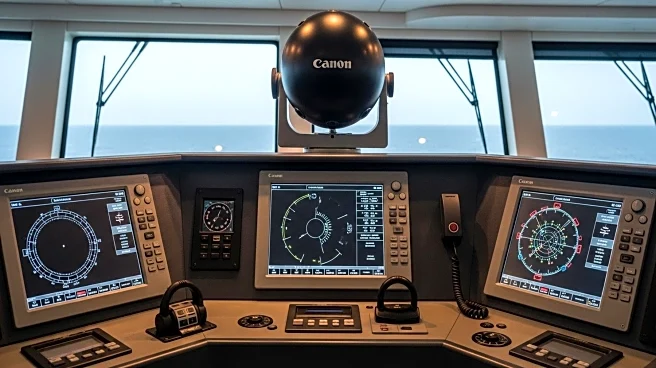What's Happening?
Zelim, a maritime safety and security company based in Edinburgh, is advocating for the mandatory implementation of advanced situational awareness technology to prevent ship collisions and improve safety at sea. This call comes in response to the Marine Accident Investigations Board's (MAIB) 2024 Annual Report, which highlighted the need to rethink the role of human watchkeepers in the digital age. The report emphasized that humans are not effective monitors and tend to become distracted when under-stimulated. The urgency of this recommendation was underscored by a recent incident involving the MV Solong and the Stena Immaculate in the North Sea, where a lack of real-time situational awareness contributed to a collision and subsequent fire. Zelim's CEO, Sam Mayall, supports the MAIB's position, advocating for AI-powered cameras and real-time alerting systems to enhance crew response times and provide critical forensic data for investigations.
Why It's Important?
The push for mandatory situational awareness technology is significant as it aims to reduce maritime accidents and fatalities. By integrating AI-based systems, ships can better monitor their surroundings, thus preventing incidents like collisions and man-overboard situations. This technology not only enhances safety but also aids in regulatory compliance and post-event investigations. The initiative reflects a broader trend towards digital transformation in maritime operations, where reliance on human vigilance is minimized in favor of automated systems. Countries like India have already mandated such technologies, setting a precedent for global maritime safety standards. If adopted widely, these measures could lead to safer seas and more efficient maritime operations.
What's Next?
The next steps involve global regulators potentially following India's lead in mandating situational awareness technology on vessels. India has already implemented regulations requiring CCTV systems on domestic vessels of 500 GT and above, with full compliance expected by 2028. These regulations include specific requirements for camera placement and integration with AI-based monitoring systems. Zelim's advocacy may prompt other countries to consider similar mandates, leading to a shift in maritime safety protocols worldwide. The adoption of these technologies could result in smarter, safer ships and a reduction in maritime accidents.
Beyond the Headlines
The call for mandatory situational awareness technology raises ethical and operational questions about the role of human watchkeepers in the digital age. As technology increasingly takes over monitoring tasks, the maritime industry must address the balance between human judgment and automated systems. This shift could lead to changes in crew training and operational procedures, emphasizing the importance of human oversight in conjunction with technological aids. Additionally, the integration of AI in maritime operations may spur innovation in other areas, such as navigation and logistics, further transforming the industry.










